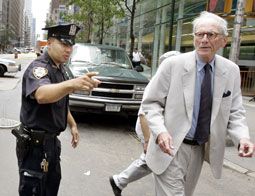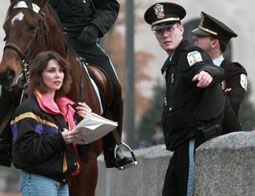By Dr. George Thompson
Founder of the Verbal Judo Institute
It’s easy to get complaints even while doing good work: just let your voice and body language operate “naturally.”
Over and over I stress in our Tactical Communications/Verbal Judo training that “natural” language is disastrous! The real skill lies in using “tactical” language.
We know that one the most dangerous words in English is “tone,” that attribute of voice that tells people exactly what we feel about them! Tone is best defined as what people “hear” you saying, not what you actually said. It’s the expressed but unsaid meaning.
 |
| (AP photo) |
Example: An old lady asks directions from a policeman doing traffic enforcement on a highway. The route she is inquiring about is almost right in front of her. When she asks, “Officer, where is Route 81?” the officer looks at her with scornful astonishment and says: “Right there lady, read the sign!”
What does the old lady hear? “Idiot!” “Stupid!”
Let’s analyze…
Officers are asked to perform a variety of roles throughout the day. A “role” is the job he is asked to do or selects to do. It is the content of his work.
But to perform a role means that officers must verbalize and here is what we know about that. Voice is one’s verbal personality, the personality as heard by the other, and it constitutes 33-40 percent of his overall impact or impression on others.
Content or ROLE constitutes a mere 7-10 percent.
So, as in our example above, if the officer actually performs the ROLE asked of him—in this case the role of “Tourist Guide,”--but his VOICE conveys a negative response (“you are stupid to ask!”) people believe the voice. The work you do is meaningless.
| “Whenever role and voice conflict, people believe the voice…" |
Remember this : Whenever role and voice conflict, people believe the voice…regardless of how well you perform the job.
The secret, then, of good customer service is to make your voice always harmonize with your role. Your role dictates the voice you use—even if the voice you use is staged--and the successful officer will “Chameleon Up” to become who he has to be to handle the situation.
You must sound like the ‘tourist guide’ you were asked to play, not sound like you feel!
But even if you get the voice right, you still have significant problems as a performer: your “other non-verbals” (ONVs) have to match the role as well!
Imagine if the officer above actually got the voice right but rolled his eyes at her question. What would have been the result? Clearly negative because ONV’s are approximately 60 percent of one’s impact in police work. The roll of the eyes calls the woman “stupid.” She won’t miss that and she most definitely will react to it!
 |
| (AP photo) |
The secret once again is to make the VOICE and the ONV’s harmonize with the role. Make your voice sound pleasant and make your facial expressions look pleasant and you have performed well, even brilliantly! You have “Chameleoned Up,” and become who you had to be to handle the woman successfully. That’s the best definition of “Street Savvy” I know!
Tactical Language, then, is language shaped to achieve the goal. Natural language expresses natural feelings of irritation or anger and always causes officers trouble!
We know that 90 percent of all the complaints that come into a department are “tonal” in nature. That is, people complain the officer was “rude,” “insensitive,” “didn’t care,” had no “empathy,” or “made me feel stupid.” If officers could only be persuaded to “act well” in front of the public, despite any negative personal feelings, the complaint numbers would drop almost out of sight—a benefit to the department—and officers would free themselves from the fallout that always accompanies departmental complaints.
Officers can also benefit from the professional satisfaction that is generated when they perform rather than react, when they “dance” where potentially they might have stumbled!
Professionalism is SHOWTIME. It helps to think of police work as continuing theater that requires you to change as the roles change. The Chameleon should be our mascot!
Do not underestimate the power of this “Showtime” perspective. I am not recommending that you be insincere or false; I am recommending that you play the role asked of you!
Remember, we know that at least 93 percent of your impact on people is your delivery style…the way you present what you present. Translated into our example above, this means that 7-10 percent of the officer’s impact on the woman asking directions is giving the correct, accurate directions, and 93 percent of his impact will be how he does it.
 |
| (AP photo) |
Take nothing out on the stage of the streets personally. It’s all role-playing.
The better an actor you are, the better you will service your community and the less stress you will experience working with the sometimes difficult and nasty public.
You are also SAFER because you are not emotionally upset. You remain calm, selecting roles and fitting your delivery style to them. The Showtime approach makes daily interaction with the public a challenge that is uplifting and positive rather than negative.
Do the right job in the right way and win every time!


